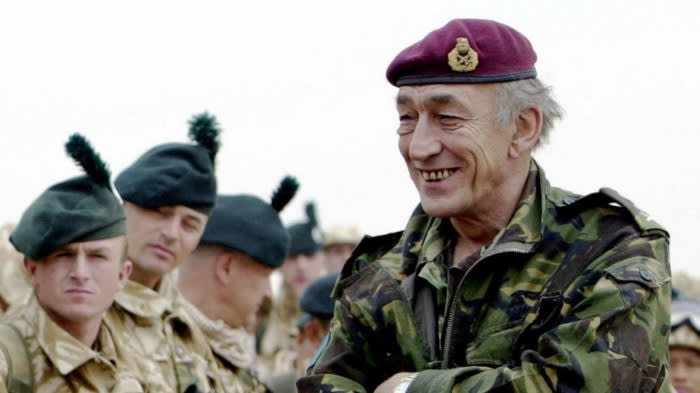The world had not been this close to nuclear conflagration since the cold war, according to Viktor Chernomyrdin, Russia’s special envoy to Serbia. It was June 1999. The scene was Pristina airport, in the immediate aftermath of the Kosovo war. A column of Russian troops had just made a surprise grab of the airfield, in a gesture of solidarity with their traditional allies the Serbs. Wes Clark, the US supreme commander of Nato, fearing that Moscow was about to fly in reinforcements, ordered General Sir Mike Jackson, who led the alliance’s peacekeeping forces in the field, to block the runway.
Jackson, who has died aged 80, held a different view. His grizzled visage, lidded eyes and granite voice testified to months of late-night diplomacy spent with Balkan warlords over drinks and cigars. But his “Prince of Darkness” mess-room nickname also masked a finely honed military mind.
“Sir, I am not going to start World War III for you,” Jackson told his superior officer. Clark repeated the order. Jackson replied in characteristic, no-bullshit style: “Sir, I am a three-star general, you can’t give me orders like this. I have my own judgment of the situation and I believe that this order is outside our mandate.” Clark countered: “Mike, I am a four-star general, and I can tell you these things.”
In the end, the situation was defused — helped by a hip flask of whisky that Jackson shared with his Russian counterpart. Clark was soon after moved on from his Nato post. And the reputation of “Macho Jacko”, as the British tabloids christened him, was sealed with a Distinguished Service Order medal.
Michael David Jackson was one of Britain’s highest-profile, post-second world war generals. Born in Sheffield in 1944, 10 weeks before his father went into action during D-Day, his first memory was of sailing on a troop ship with his mother to Libya to join his father who had been stationed after the war in Tripoli. At Stamford boarding school back in England, Jackson amused himself making Airfix models, reading Eagle and Hotspur comics, and became a boy scout and then a cadet. Aged 17, he successfully applied to Sandhurst military academy and then earned a degree in Russian studies from Birmingham university while serving in the Intelligence Corps before transferring to the Parachute Regiment in 1970. It was the beginning of a varied and illustrious military career. “I am a soldier. I have held every rank in the British Army from officer cadet to four-star general . . . I remain a soldier at heart,” as he wrote in his forthright 2006 memoir Soldier.
Jackson served three tours in Northern Ireland: in the first, as a junior adjutant during Bloody Sunday, when British troops killed 13 Catholic men during a civil rights march in Londonderry in January 1972; in his last, in the early 1990s, as one of the UK’s three brigade commanders there. He also had stints at the Ministry of Defence in London. The first, in 1982, meant he missed the Falklands War; the second in 1992, as head of personnel services, meant he missed the first Gulf war. Jackson, with his marked sense of humour, liked to describe that apparently humdrum role as being all about B’s: “bands, belts, berets, badges, buttons, banners, bars (medals), bars (booze), burglary, bullying, barbiturates, bosoms, babies, bonking and buggery.”
Happier in the field than among civil servants, Jackson returned to active duty in 1995 with his first Balkans tour. In 2000, back in England, he was promoted to full general and, in 2003, a month before the Iraq invasion, made chief of the general staff, head of the British Army.
Ironically, given the controversies about British participation in the second Gulf war, one of Jackson’s stormiest moment as CGS followed a hugely unpopular army reorganisation that subsumed several famous regiments, such as the Royal Scots. Jackson maintained it was the right thing to do, arguing that if the British army never accepted the need for change it would “still be in red coats and fighting in squares”. Twice married, with three children — two of whom joined the armed forces — Jackson retired in 2006, one month short of 45 years of service.
To his regret, Jackson never took an active role in a conventional war: all his tours of duty involved peace-supporting operations. After the fall of the Berlin wall, he also worried that the UK had extracted an excessive peace dividend from military spending. But in contrast to his reputation of being a hard-drinking soldier’s soldier, Jackson was no warmonger.
He always insisted that wars were a continuation of politics by other means — the Clausewitzian adage he first read as a teenager — and was adamant that some struggles, especially the “war on terror”, could never be solved by military means alone. He also criticised the lack of US postwar planning in Iraq, calling secretary of defence Donald Rumsfeld’s assertion that the US did not “do nation building” as “intellectually bankrupt” and “nonsensical”.
Rupert Smith, a celebrated former British general who worked alongside Jackson, described him as a natural commander, whose “intelligence and breadth of view, his ability to analyse the issue in hand, to identify its essence and the necessary action to deal with it, was very clear . . . human and moral factors always figured in his thinking”.
This article has been amended to note that the incident described at Pristina airport took place in 1999
